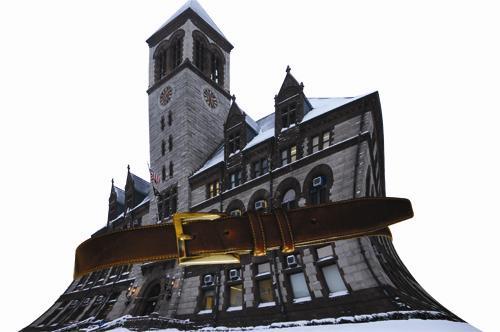Declining revenue during the current national economic crisis has Cambridge officials reevaluating municipal programs and tax structures in a city that has historically enjoyed a large budget.
In February, Governor Deval L. Patrick ’78 decreased state aid to Cambridge by $2.6 million for the current fiscal year, which ends in June. The loss of funds is small compared to the city’s overall budget of $434 million. But, combined with the fact that “all other revenue sources are ‘flat’ during this economic downturn,” it was expected to necessitate “serious expenditure reductions,” wrote City Manager Robert W. Healy in a memo to the City Council on Feb. 2.
While city officials report that they are managing the current budget shortfall, several say that further decreases in state aid and slowdowns from other revenue sources may cause fiscal woes—or perhaps higher taxes—in Cambridge’s future.
MANAGING FOR NOW
In order to make up for the loss in state funds this year, the vacancy committee—which determines which city jobs to fill and when—has allowed some seats to stay vacant longer that usual, said Assistant City Manager for Fiscal Affairs Louis A. Depasquale.
There are currently 65 vacant positions in city departments, Depasquale said.
By leaving positions unfilled, the city avoids paying the corresponding salaries, which has made up for the loss of state revenue, Depasquale said.
Personnel Department Director Michael Gardner, who also serves on the committee, said they have avoided cutting direct service personnel and are moving faster to fill part-time positions, which are more flexible and less costly.
TROUBLE AHEAD
Along with the cuts for the current fiscal year, the state department of revenue announced in February that aid to communities would be cut for the 2010 fiscal year.
According to those projections, Cambridge stands to receive $7.6 million less in state aid next year than it did this year, for a total of $28 million in state funding.
These numbers will be finalized when the state Senate and House of Representatives approve the budget this spring.
Beyond state aid and property taxes, the city has a limited number of revenue sources, which include building permits, hotel and motel taxes, and water and sewage revenues, all of which have decreased in recent months, Healy’s Feb. 2 memo reported.
Over the past several months the city has seen a slowdown in requests for building permits, which are another source of revenue. Small projects continue to come through the Inspectional Services Department, but there are fewer large, revenue-generating projects, said Cambridge Building Commissioner Ranjit Singanayagam.
He added that winter and spring are traditionally slow times for building and the city is hopeful that projects will pick up over the summer.
THE TAXMAN
Increased property taxes may be one source of funds to fill the revenue shortfall for 2010. Sixty percent of the city’s current revenue comes from property taxes. But the property tax rates in the city are well under the rates allowed by Massachusetts law, and leave ample room for increases.
Cambridge charges $7.56 in tax per $1,000 of residential property value, the lowest rate in the Boston area.
On Feb. 9, Healy informed the council that the city could be collecting up to $92.7 million more in taxes, according to state limits.
Healy also told the City Council at that meeting that it will be “difficult” for the city to maintain the relatively low level of property tax increases it has had in the past five years.
STUDENT SPENDING
Cambridge schools are unaffected by the loss of funding this year because the city has a policy of insulating the schools from mid-year budget changes, said Nancy Tauber, co-chair of the school committee’s budget subcommittee.
The current draft of the school budget calls for an increase of 2.5 percent over the 2009 budget, which nevertheless represents significant cutbacks in school expenditures, due to increases in energy and personnel costs, Tauber said.
The school department’s central administration has agreed to forego cost-of living increases for the coming fiscal year, contributing to a $1.6 million reduction in its budget, and the high school has agreed to cut $500,000 from its budget, Tauber said. [SEE CORRECTION BELOW]
Despite these cuts, school committee members said that the schools are trying to avoid cutting teacher salaries or the quality of classroom instruction, although there will be some consolidation of classes.
School committee member Patricia M. Nolan ’80 said that Cambridge will likely be able to maintain its current level of student expenditure, which is double the state average.
“Other districts would die to have our resources,” Nolan said.
—Staff writer Sarah J. Howland can be reached at showland@fas.harvard.edu.
CORRECTION
The Mar. 5 news article "City Faces Budget Cuts" incorrectly attributed a statement that the Cambridge school department's central administration had agreed to forego cost-of-living increases for the coming fiscal year to the school committee’s budget subcomittee co-chair Nancy Tauber. In fact, that statement should have been attributed to fellow budget subcommittee co-chair Luc Schuster.
Read more in News
Barker Center Ends Free Coffee Program













